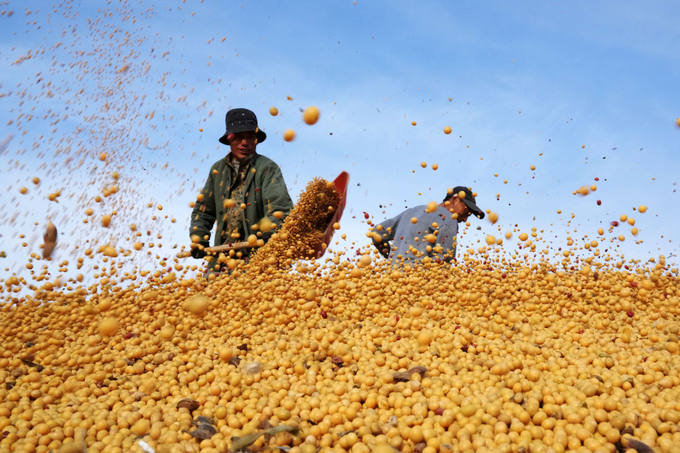November 27, 2025 | 18:51 GMT +7
November 27, 2025 | 18:51 GMT +7
Hotline: 0913.378.918
November 27, 2025 | 18:51 GMT +7
Hotline: 0913.378.918

Workers air soybeans in Beian, Northeast China's Heilongjiang province, Oct 20, 2022. Photo: Xinhua
The Ministry of Agriculture and Rural Affairs said in a statement on Friday that the country will adopt a host of incentives in support of farmers who grow soybeans to bolster the production of edible oil.
The central government will offer more subsidies to farmers who grow corn and soybeans and encourage provincial authorities in Northeast China, one of the country's main grain growing areas, to do the same.
More credit will be extended to soybean farmers, who will also be offered insurance to cover costs and guarantee incomes, the statement said.
More farmers in the north, the southeast and the lower and middle reaches of the Yangtze River will be encouraged to take part in a pilot program under which corn and soybeans are grown alongside one another. Local authorities will also encourage farmers to grow soybeans alongside fruit saplings and sorghum.
To bolster technological services, the ministry said it plans to come up with tailored solutions for each of the 906 soybean-growing counties, including steps to promote the use of better varieties, cultivation methods and machinery.
Family farms, rural cooperatives and agribusinesses will also be encouraged to grow soybeans, and the government will encourage the development of professional service providers to offer low-cost, convenient and all-around services to soybean growers.
The ministry said that the China Grain Reserves Group Co, the country's largest grain storage and transportation company, will step up efforts to purchase soybeans from growers in Heilongjiang province and the Inner Mongolia autonomous region, which grow the most soybeans in China.
As the world's largest importer of soybeans, China began bolstering efforts to expand cultivation last year, as its leadership called for heightened efforts toward food security and self-sufficiency.
The country imported 91.08 million metric tons of soybeans in 2022, valued at $40.84 billion, both figures down by 5.6 percent year-on-year, according to the General Administration of Customs.
Yin Ruifeng, a soybean researcher at the Ministry of Agriculture and Rural Affairs, said China had relied on the international market for over 85 percent of its soybeans before 2022, and there was much room to improve the level of self-sufficiency.
However, after many farmers switched to growing soybeans last year, the rise in domestic production led to a downturn in prices, which dimmed enthusiasm, she said.
"It is a time-consuming process to raise the level of soybean self-sufficiency, and more work must be done to improve domestic varieties and build up domestic supply chains," she said.
(CND)

(VAN) A new study reveals how the simultaneous effects of ocean acidification, salinity and loss of oxygen are making the world more fragile.

(VAN) Hopes are growing that the creation of the first 3D turkey gut model could be a turning point in the battle against the virulent blackhead disease.

(VAN) Tyson, America’s biggest meat supplier, plans to shutter one of its largest beef processing plants as the industry continues to struggle with low cattle supplies and political pressure from Washington.

(VAN) New FAO study shows how digital solutions are empowering farmers and fishers to prevent losses and build resilient agrifood systems.

(VAN) Brazil's COP30 presidency pushed through a compromise climate deal on Saturday that would boost finance for poor nations coping with global warming but that omitted any mention of the fossil fuels driving it.

(VAN) Poultry farmers in the UK have been warned that they could face one of the worst winters yet for bird flu.

(VAN) Prices of main-crop paddy have risen sharply, with jasmine rice hitting 16,100 baht per tonne — the highest level in years.